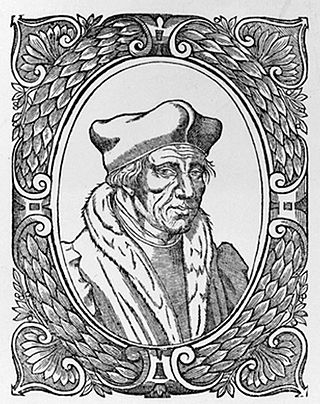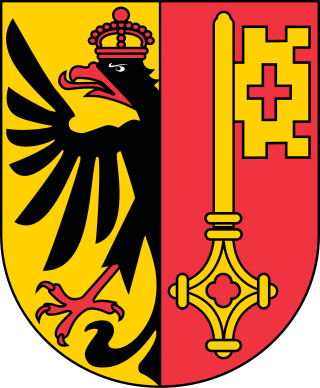Related Research Articles

John Calvin was a French theologian, pastor and reformer in Geneva during the Protestant Reformation. He was a principal figure in the development of the system of Christian theology later called Calvinism, including its doctrines of predestination and of God's absolute sovereignty in the salvation of the human soul from death and eternal damnation. Calvinist doctrines were influenced by and elaborated upon the Augustinian and other Christian traditions. Various Congregational, Reformed and Presbyterian churches, which look to Calvin as the chief expositor of their beliefs, have spread throughout the world.

Theodore Beza was a French Calvinist Protestant theologian, reformer and scholar who played an important role in the Protestant Reformation. He was a disciple of John Calvin and lived most of his life in Geneva. Beza succeeded Calvin as the spiritual leader of the Republic of Geneva.

Étienne Dolet was a French scholar, translator and printer. Dolet was a controversial figure throughout his lifetime. His early attacks upon the Inquisition, the city council and other authorities in Toulouse, together with his later publications in Lyon treating of theological subjects, roused the French Inquisition to monitor his activities closely. After being imprisoned several times, he was eventually convicted of heresy, strangled and burned with his books due to the combined efforts of the parlement of Paris, the Inquisition, and the theological faculty of the Sorbonne.

Jacques Lefèvre d'Étaples was a French theologian and a leading figure in French humanism. He was a precursor of the Protestant movement in France. The "d'Étaples" was not part of his name as such, but used to distinguish him from Jacques Lefèvre of Deventer, a less significant contemporary who was a friend and correspondent of Erasmus. Both are also sometimes called by the German version of their name, Jacob/Jakob Faber. He himself had a sometimes tense relationship with Erasmus, whose work on Biblical translation and in theology closely paralleled his own.

William Farel, Guilhem Farel or Guillaume Farel, was a French evangelist, Protestant reformer and a founder of the Calvinist Church in the Principality of Neuchâtel, in the Republic of Geneva, and in Switzerland in the Canton of Bern and the Canton of Vaud. He is most often remembered for having persuaded John Calvin to remain in Geneva in 1536, and for persuading him to return there in 1541, after their expulsion in 1538. They influenced the government of Geneva to the point that it became the "Protestant Rome", where Protestants took refuge and dissidents such as Catholics and unitarians were driven out, some were even killed for their beliefs. Together with Calvin, Farel worked to train missionary preachers who spread the Protestant cause to other countries, and especially to France.

Pierre Viret was a Swiss Reformed theologian, evangelist and Protestant reformer.
Corderius, was a French-born theologian, teacher, humanist, and pedagogian active in Geneva, Republic of Geneva. He taught at the School of Lausanne, where he was a director.

Marguerite de Navarre, also known as Marguerite of Angoulême and Margaret of Navarre, was a princess of France, Duchess of Alençon and Berry, and Queen of Navarre by her second marriage to King Henry II of Navarre. Her brother became King of France, as Francis I, and the two siblings were responsible for the celebrated intellectual and cultural court and salons of their day in France. Marguerite is the ancestress of the Bourbon kings of France, being the mother of Jeanne d'Albret, whose son, Henry of Navarre, succeeded as Henry IV of France, the first Bourbon king. As an author and a patron of humanists and reformers, she was an outstanding figure of the French Renaissance. Samuel Putnam called her "The First Modern Woman".

Humanism in France found its way from Italy, but did not become a distinct movement until the 16th century was well on its way.
Antoine Froment (1508–1581) was a Calvinist Protestant reformer in Geneva. Froment is best remembered for his role in initiating and solidifying the Reformation in Geneva along with William Farel and John Calvin. His role in these events, however, is smaller compared to the tremendous accomplishments of Farel and Calvin.

Marie Dentière was a Walloon Protestant reformer and theologian, who moved to Geneva. She played an active role in Genevan religion and politics, in the closure of Geneva's convents, and preaching with such reformers as John Calvin and William Farel. In addition to her writings on the Reformation, Dentière's writings seem to be a defense and propagation of the female perspective in the rapidly changing world. Her second husband, Antoine Froment, was also active in the reformation.

The International Monument to the Reformation, usually known as the Reformation Wall, was inaugurated in 1909 in Geneva, Switzerland. It honours many of the main individuals, events, and documents of the Protestant Reformation by depicting them in statues and bas-reliefs.
Louis Bouyer, CO, was a French Catholic priest and former Lutheran minister who was received into the Catholic Church in 1939. During his religious career he was an influential theological thinker, especially in the fields of history, liturgy and spirituality, and as peritus helped shape the vision of the Second Vatican Council. Along with Joseph Cardinal Ratzinger, Hans Urs von Balthasar, and others, he was a co-founder of the international review Communio. He was chosen by the pope to be part of a team to initiate the International Theological Commission in 1969.

Gérard Roussel (1500–50) was a French cleric, a student of Jacques Lefèvre d'Étaples and later a member, with his former teacher, of the Circle of Meaux around Guillaume Briçonnet, bishop of Meaux. This group was characterized by evangelical sensibilities, but all the while remaining Catholics, at a time when religious identities were unclear and a matter of dispute, due to the very recent Protestant Reformation. Gérard Roussel, along with Jacques Lefèvre d'Étaples, was described by the historian Thierry Wanegffelen as being "between two pulpits", that of Rome and that of Geneva where Jean Calvin would settle permanently in 1541, and, more generally, between Catholicism and Protestantism.

Antoine de la Roche Chandieu was a French Reformed theologian, poet, diplomat and nobleman. His trend toward the Reformed Protestantism was strengthened during his study of law at Toulouse; after a theological course at Geneva, he became the pastor of the Reformed congregation of Paris between 1556 and 1562.
Jeanne de Jussie was a Genevan Roman Catholic nun and writer. She documented the role of the Protestant Reformation in the Poor Clares convent in Geneva.

The history of Geneva dates from before the Roman occupation in the second century BC. Now the principal French-speaking city of Switzerland, Geneva was an independent city state from the Middle Ages until the end of the 18th century. John Calvin was the Protestant leader of the city in the 16th century.
The Evangelical Reformed Church of the Canton of Vaud is a Reformed cantonal state church in Vaud.

Johann Wilhelm Baum, sometimes known as Jean Guillaume Baum was a German Protestant theologian, known for his studies involving the Protestant Reformation.

Guillaume Franc was a French musician and composer active in Geneva and Lausanne. He is regarded as instrumental in the development of both the Genevan Psalter and the Lausanne Psalter. Some of the melodies are still used in hymns in the 21st century.
References
- ↑ http://www.hls-dhs-dss.ch/textes/f/F11070.php (French language)